It’s that time of the week, fine, good-looking folk of the internet. This is an eventful episode, so I’ll waste no time. Have some coffee nearby, maybe also some pie.
Local unkindness
This episode starts in a relatively innocent way, with three kids playing catch in Twin Peaks. There seem to be no vehicles around, which is good news, considering what happened to a fellow of their youthful tyke some episodes ago. But upon losing the ball and searching for it, they find somebody quite related to that horrendous event. No, it’s not Richard Horne – you can breathe easy, but not that much. They find Miriam, who somehow survived her cruel assault at Dick’s hands last episode, bloody and crawling out of the woods. Thus, the children do the most sensible thing: find an adult, preferably a parent. There’s no telling how tightly Miriam is hanging on to life, or if it will be long enough to talk to the police. But Dick’s scheme to wash his hands of his crimes may be compromised.
Tension drastically spikes elsewhere in town, as Becky receives a distressing call, after which she also does the most sensible thing: call an adult, most certainly her mother. Following her daughter’s call, which involves her husband Steven, Shelly hurriedly leaves the diner to aid Becky. Maintaining the foreboding, unknown nature of the scene, Becky pulls out a pistol from under the couch. Her mother arrives shortly after, but rather than telling her what is wrong, she yoinks her car while saying “I hate him”. Shelly jumps onto and holds to the bonnet of the car in an attempt to stop her. But after a fit of fury and reckless driving, Becky shakes off her mother, who falls to the grass.
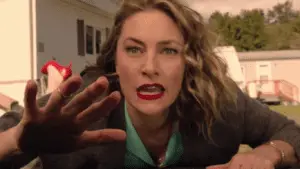
Becky drives away, effectively becoming something of a dick herself. Her intent is most clear: she is going to kill her husband. While she may have rightful reasons, her means don’t particularly speak highly of her as a character either. In the ‘Lynchverse’, drugs generate character flaws by the bloody, bloody fistfuls. The beginning to this episode boasts a style and dynamic akin to the lighter half of Lost Highway, fast tempo and brimming with tension under broad daylight. However, Angelo Badalamenti’s work also deserves some comment. His work in this scene in particular summons a vaguely Bernard Herrmann-esque spirit, chilling and grievous. Its effect when compared to his very own ominous, looming style afterwards, when the tempo dies down a bit, is that of latent murder in the mind.
Mischief…
Local kind soul and soothing musician Carl Rodd finds Shelly, who seems to be alright, if only deathly worried. She asks Carl for a ride back to the Double R Diner. During the ride, he tells her that everybody in the trailer park knows the young couple fight constantly. And that his thoughts and support are with Becky and her mum. Following Norma’s advice on the phone, they radio Shelly’s ex-husband, Bobby. Meanwhile, Becky has made it to her destination: an apartment building. Although a tenant tells her that nobody is in the apartment, Becky still empties the gun on the door. Maybe she needed a physical outlet for frustration, or she just didn’t believe the tenant. If it’s the latter case, then her intent was definitely compounded with every bit of willingness to consummate it.
Downstairs, we see Steven with a character from the original series, having just barely missed death by disproportionate-retribution-to-adultery. She is Gersten Hayward (Alicia Witt), younger sister to Donna, who we are unlikely to see in The Return. Naturally, the tenant who spoke to Becky has called the cops, and they’re now on their way. And the rest is told by itself. Later that night, Shelly and Bobby have a talk with Becky at the Double R Diner. Bobby’s standing in the Sheriff’s department avoided her being imprisoned, but she still has to pay for the damages. She doesn’t react well to this, but her dad decides to loan her the money. Becky does show the decency to refuse a loan from her mother, as she had already helped her out for a while now.
… and the inevitable reprimanding
Of course, this doesn’t mean the problem is over. Her parents agree that they have to get her out of that trailer and away from Steven. He is clearly a toxic element, but Becky justifies his behaviour by saying he’s going through a bad time. That’s rich, considering that earlier in the day, she was ready to kill him. This is, unfortunately, quite real a scenario concerning toxic relationships where abuse festers, and people don’t feel prepared to break off the bond. It’s a circle of vice that’s not easily broken if the relationship continues. Finally, Becky apologises to her mother as they embrace. Despite their questionable deeds during their youth, Shelly and Bobby did become responsible parents.
However, even now, Shelly herself might be struggling to break off a pattern. It only takes one look at him through the diner’s window for her to run to his arms. We could give her the benefit of the doubt, though. His behaviour with her may be so decent that one may find his profession unthinkable. But Red is every bit the criminal that Leo was, and he’s perhaps twofold as dangerous. The atmosphere turns awkward when Shelly returns, but an incident involving a child firing a gun through the Diner’s window breaks the quiet. Nobody is harmed in the end, though, but we do get a strange shift in tone and mood, as Lynch does.
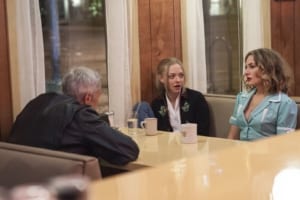
The incident occurred through parental negligence. A child, who looks like a proper douche, took an unsecured firearm from his parents’ vehicle and decided to test it out, the little fucker. Meanwhile, the rest of the hindered drivers keep on honking on their horns like ASSHOLES. However, the one who is honking the most is an anxious woman with an ill girl in her car. So her haste is quite justified in this instance. But one look at the girl, and the word ‘ill’ becomes something of an understatement. The child stirs like the dead coming back to life, and the tone of her skin doesn’t look fitting of anyone with functioning organs. And the continuous gurgling of an unpleasant looking fluid don’t speak too well of the her health.
Bobby looks on puzzled, disgusted and probably not the least bit hungry, while the woman screams in horror. There may really be no purpose for this scene other than elucidate a flavour of uncanny to confuse the viewer. And the woman’s reaction does rather strip this event from any long-term relevance. Not that this is a bad thing. One of Lynch’s stylistic beauties is the ability to create a mutable flux out of a narrative, taking away our footing and virtually turning it into a flying carpet to take us places. Thus, we ride from domestic tragedy, to stark contrast in ways of parenting, and to the incipience of a zombie apocalypse that might be forgotten next episode. We don’t know whether to dread, to weep, or to laugh. So we may as well do all three.
Reach out and touch death
In Buckhorn, Detective Macklay and the FBI have come to the place Bill Hastings talked about during the interview with Agent Preston. It’s something of an abandoned lot with cabins and trailer boxes. Though startled at returning to the site where Ruth and he met Major Briggs, he still gives details on how they entered the ‘otherside’. However, he doesn’t remember what happened after the encounter. GORDON and Albert catch sight of a strange man apparently fading in and out of existence, apparently a Woodsman. Guns in hand, they venture through the fence while Tammy covers their backs. By now, the sound of electricity crackling speaks clearly on the otherworldly nature of this site. GORDON and Albert are about to plunge into danger like never before.
This is all the more evident as the sound of crackling intensifies. GORDON witnesses some kind of spiraling portal in the sky, becoming larger by the second. However, only he seems able to see it; everybody else only sees standing with his arms reaching towards the sky. At this point, everyone is way past the threshold of skepticism, so there’s no judging him. As viewers, though, we are afforded a look at what the Director is witnessing: the Convenience Store, where the Woodsmen dwell. As soon as GORDON starts flickering out of existence, in risk of crossing over to one of the most dangerous places in this narrative, Albert pulls him back. Following this confirmation of Bill’s claim, Albert spots something in the vicinity, a body. Naked, dirty, and quite headless, these are the remains of Ruth Davenport.
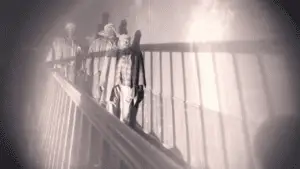
Meanwhile, Diane catches sight of a Woodsman sneaking towards the side of Detective Macklay’s car. She doesn’t warn anybody of it; but if Lt. Knox’ similar lack of a definite reaction when seeing one is a hint, there is a possibility that people can’t always actually see them even if they’re within line of vision. Then again, since last episode, there is some doubt on her role as passive witness of these events. An instant later, we hear an unpleasant crunching noise in the backseat of the Detective’s car. The Woodsman has killed Bill Hastings, in extremely harrowing fashion. The FBI doesn’t have a witness of the otherside to aid their investigation, only a set of coordinates, which they found written on Ruth’s arm. These may coincide with the ones Hawk, Bobby and Truman found in Twin Peaks.
Black fire
While Bobby takes care of that most peculiar incident which took place outside the Double R Diner, Hawk and Truman do some investigating at the Sheriff’s Department. They’re examining a map of the Twin Peaks’ region to get an idea of the place they’re headed: Jack Rabbit’s Palace. The Google Map shows the possible location, but no roads to reach it; so much for modern technology in this instance. Therefore, Hawk suggests looking at another map, an ancient map, presumably of his native heritage. As per Hawk’s interpretation, this map doesn’t measure so much in terms of location as it does in terms of the land’s condition. This esoteric reading highlights the presence of man-made electricity, and diseased soil or death. Both of these are key motifs in The Return.
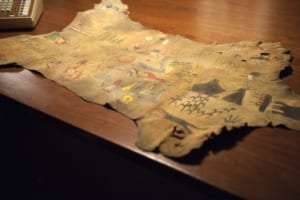
Thusly, Hawk theorises that their destination will be Blue Pine Mountain, a revered, holy place. Considering Major Briggs’ role and words in Season 2, one may think this is the entrance to the White Lodge. The finale before the revival taught us that both Black and White Lodges are one and the same. It’s the location and manner of entrance that made all the difference. Glastonbury Grove, which may be the symbol of black fire on the map, was the way into the Black Lodge, open on one particular date. By that logic, the location Major Briggs is pointing us to may be a place, equal parts familiar and foreign.
Truman doesn’t dismiss the validity of this map; in fact, he’s picks up on its coherence quite quickly. In particularly, he is curious about one symbol on the map, which we also saw printed on the message Major Briggs left and in Mr. C’s card. Hawk only says that he truly wouldn’t like to find out the meaning of that symbol. Alas, the association is becoming clear to us viewers. A second later, Lucy patches through a call from Margaret. She knows Hawk has found something, and she warns him that there is fire where they’re going. Definitely not a good sign. Always heed the Log Lady, ladies and gentlemen. It’s time to fear.
A picnic here and there
It’s back with the FBI folks and Detective Macklay. After a brief look at a photo of the coordinates on Ruth’s arm, which Diane seems to take subtle interest in, they all partake of a picnic by Twin Peaks‘ definition. That is, coffee and donuts, and a cigarette for Diane. Here is where we got that delightful teaser of the The Return featuring David Lynch eating a donut, which in many cultures is a synonym for love and joy. As they eat, they discuss what they know so far. When GORDON and Albert bring up the topic, Diane mentions that she believes she saw a strange, homeless man around the police car, thus destroying my theory and making me look like a fool. Cue a ‘Fuck you, Milan’, thank you very much. Nobody else saw him, however; let alone the numerous ones GORDON saw.
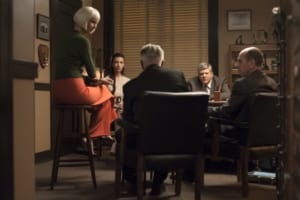
In Vegas, Bushnell calls for ‘Dougie’. Amusingly, the only reason Coop makes it as switfly to the boss’ office is because Phil is literally luring him with coffee. Bushnell tells ‘Dougie’ that his investigative work has unearthed links with organised crime and corruption in the office. The boss reasons that the Mitchum brothers, while possessing a bad reputation, are not part of the conspiracy but are being manipulated by someone else. This, we know, is Anthony, who works by Duncan Todd’s command, who works under Cooper’s Doppelganger’s command. Bushnell tells ‘Dougie’ that the Mitchums have requested a chat with him. Coop is to give them a 30 million dollar payout check, which undoes the seed of doubt Tony attempted to sow.
Meanwhile at brunch, Bradley talks to his brother Rodney of a dream he had. In spite of their desire to kill ‘Dougie Jones’, Bradley’s intentions become increasingly dampened by this dream, which turns out prophetic on very particular details. First, it’s on Rodney’s accidental cut from last episode having healed completely. And then, it’s on the cherry pie Coop’s weird ‘friends’ at the Black Lodge got him to purchase. Thus, right in the middle of the desert, a timelessly perfect place to kill someone and bury them, their willingness to kill ‘Dougie’ deflates. Upon frisking him for weapons or microphones, Bradley finds the check, which effectively makes Coop a friend in their eyes.
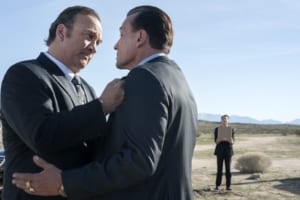
And that is how you befriend alleged gangsters. Hack their dreams. I can honestly see some mixed reaction on this as a sort of cheap cop-out, or a peculiar instance of Deus-Ex-Machina. And technically it is, but I see the overall effect to be worth it. All menaces against a character in as vulnerable a state as ‘Dougie Jones’ falling flat reaches artful levels of absurdity and comedy. As previously mentioned, Lynch can give me nightmares, and make me sigh, cry, or laugh until the back of my head hurts, all at once. The rest of the characters give us the narrative axis of active resistance against evil (if you will). But our Agent, he’s becoming the ultimate anti-hero, in the classical oldest sense of the term.
Later that night, the Mitchums take Coop out, for dinner at a fancy restaurant. After a toast, something catches Cooper’s attention, in that special instinctive manner. The man playing the piano changes the tune from festive to slow and sweetly melancholic. Enter the old lady from the casino, Mrs. “Thank you, Mr. Jackpots”. Using the money from one of the megajackpots Cooper won, she has turned her life around. She has a house, a little dog, and her son is back in her life again. Rodney and Bradley are not blind to this display of gratitude. She reprises her words “Thank you, Mr. Jackpots” in the most heartwarming way. And to put the cherry on the cake, or in this case, in the pie. In comes… well, the pie, the Mitchums’ girls, and a triumphal pair of words to send us home happy.
“Damn good”. Coop may just be repeating what Rodney said, but the lucidity in those words is evident. What else is there to say? A thoroughly enjoyable episode. Stay tuned for next week, lovelies.
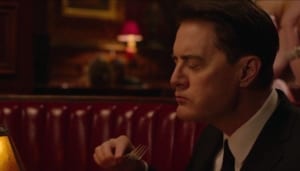
Twin Peaks: The Return – Part 11 Credits
Directed by David Lynch
Written by Mark Frost and David Lynch
All images are courtesy of Showtime

